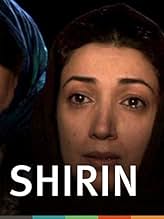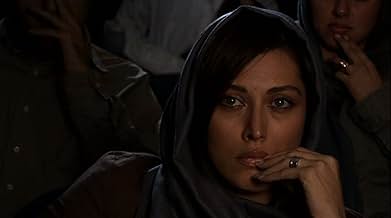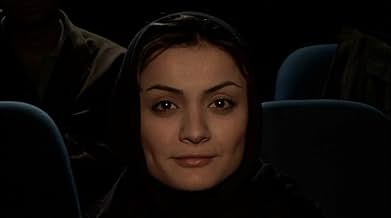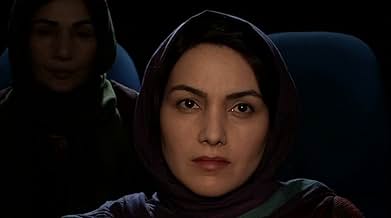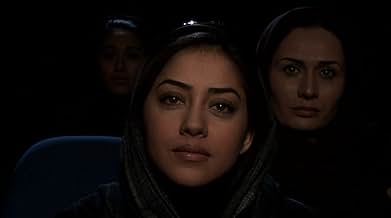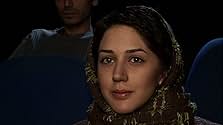Agrega una trama en tu idiomaWomen's expressions are captured as they watch Khosrow and Shirin, a 12th-century Persian play staged by Kiarostami, revealing their reactions to the unseen narrative.Women's expressions are captured as they watch Khosrow and Shirin, a 12th-century Persian play staged by Kiarostami, revealing their reactions to the unseen narrative.Women's expressions are captured as they watch Khosrow and Shirin, a 12th-century Persian play staged by Kiarostami, revealing their reactions to the unseen narrative.
- Dirección
- Guionista
- Elenco
- Premios
- 1 nominación en total
Zar Amir Ebrahimi
- Woman in audience
- (as a different name)
Vishka Assayesh
- Woman in audience
- (as Vishka Asayesh)
- Dirección
- Guionista
- Todo el elenco y el equipo
- Producción, taquilla y más en IMDbPro
Opiniones destacadas
This is an amazing film.
I knew very little about it when I went except that 'all it showed' was a lot of women's faces watching a film ... What I experienced, however, was a brilliant - and daring - piece of multi-layered cinema. Yes, 'all we watch' are the faces of a group of 140 (apparently) Iranian women - plus Juliet Binoche - watching the traditional story of Shirin, an Armenian Queen.
We hear the soundtrack (and, in my case, read the subtitles) and see the women's reactions. But we never see what they see. They are looking past and beyond us.
The first thing that strikes one is the beauty of - and in - the faces of these women - and how beautifully Kiarostami lights and shoots them. Not to mention the complex and subtle rhythms of the edit. Women from their late teens into their sixties achingly expressive like renaissance portraiture ...Holbein or Velasquez or some of the Dutch masters come to mind ... And even after is had dawned that some, or perhaps all, of these faces might belong to actresses, each cunningly made up, the layers of the film, for me, only deepened: here, after all, is the dialectic of actors being watched - 'as themselves'.
Because, we wonder, are they aware that they are being filmed, watched? Of course. Kiarostami would have explained the set-up to them. That must be why he has managed to persuade so many famous and attractive Iranian women actors to take part; what a show reel for them! But through this choice, the director allows us to watch them while wondering how much they might, at any one point, be 'acting'? How much they are aware from moment to moment, these 'fakers', these 'deceivers', that they are being observed? And when, as they become engrossed in elements of the story, they forgot? And become 'themselves'.
And they do become engrossed. The tears flow. As did mine - watching their tears. They flinch when swords scythe, when heads and hands are chopped off. They lower their eyes with a memory of their own. Or in horror. They smile with recognition. Their faces light up. Darken.
So much is shown. But so much is not revealed. So much work is left to our imaginations.
And of course, there is the whole layer of these women being Iranian. A culture we don't know. Or think we know and dismiss out of hand, or patronise out of our ignorance. Every one of the women - even Juiette Binoche - is wearing a headscarf, headscarves that themselves become expressive of the wearer's individuality. How they drape them. Each one, like each face, unique. How each scarf lies. How each scarf frames the face. How the women themselves move the folds and adjust them, or play with, or arrange the material, unconsciously, as they watch...
And on another level, a deeper level, it's a great choice of Kiarostami's, that the film they are watching is about Shirin, a strong women, a lover, a hero Queen - an epic story crammed with sex, passion, betrayal, longing, lust and all expressed in the most heightened language and emotion. Because, as we watch these women watching, we know that they have, collectively, experienced all of this. Their eyes tell us that. Their tears. Their little smiles of recognition. Their open and child-like faces.
This is the ultimate success of the film. We meet 140 Iranian women. And one French one - also a clever choice ... We have a chance to watch them intimately. We, in the dark, watch them in the dark, watching. We fall in love with them; no less so the older ones, whose faces are etched with life. We know, young and old, they have all lived and had lives and loves and children, some of them, and grief and failures and loss and triumph over odds. And yet we know nothing of their stories. The details. Yet yearn to know them. The unknowable.
This is a film which gives the lie to a million clichés and 'certainties' about Iran, and 'freedom' and Islam and 'The Other'. I do recommend people to find a place to see it. But in a cinema. On a big screen. After all, it's an epic - but on a vibrantly human scale.
I knew very little about it when I went except that 'all it showed' was a lot of women's faces watching a film ... What I experienced, however, was a brilliant - and daring - piece of multi-layered cinema. Yes, 'all we watch' are the faces of a group of 140 (apparently) Iranian women - plus Juliet Binoche - watching the traditional story of Shirin, an Armenian Queen.
We hear the soundtrack (and, in my case, read the subtitles) and see the women's reactions. But we never see what they see. They are looking past and beyond us.
The first thing that strikes one is the beauty of - and in - the faces of these women - and how beautifully Kiarostami lights and shoots them. Not to mention the complex and subtle rhythms of the edit. Women from their late teens into their sixties achingly expressive like renaissance portraiture ...Holbein or Velasquez or some of the Dutch masters come to mind ... And even after is had dawned that some, or perhaps all, of these faces might belong to actresses, each cunningly made up, the layers of the film, for me, only deepened: here, after all, is the dialectic of actors being watched - 'as themselves'.
Because, we wonder, are they aware that they are being filmed, watched? Of course. Kiarostami would have explained the set-up to them. That must be why he has managed to persuade so many famous and attractive Iranian women actors to take part; what a show reel for them! But through this choice, the director allows us to watch them while wondering how much they might, at any one point, be 'acting'? How much they are aware from moment to moment, these 'fakers', these 'deceivers', that they are being observed? And when, as they become engrossed in elements of the story, they forgot? And become 'themselves'.
And they do become engrossed. The tears flow. As did mine - watching their tears. They flinch when swords scythe, when heads and hands are chopped off. They lower their eyes with a memory of their own. Or in horror. They smile with recognition. Their faces light up. Darken.
So much is shown. But so much is not revealed. So much work is left to our imaginations.
And of course, there is the whole layer of these women being Iranian. A culture we don't know. Or think we know and dismiss out of hand, or patronise out of our ignorance. Every one of the women - even Juiette Binoche - is wearing a headscarf, headscarves that themselves become expressive of the wearer's individuality. How they drape them. Each one, like each face, unique. How each scarf lies. How each scarf frames the face. How the women themselves move the folds and adjust them, or play with, or arrange the material, unconsciously, as they watch...
And on another level, a deeper level, it's a great choice of Kiarostami's, that the film they are watching is about Shirin, a strong women, a lover, a hero Queen - an epic story crammed with sex, passion, betrayal, longing, lust and all expressed in the most heightened language and emotion. Because, as we watch these women watching, we know that they have, collectively, experienced all of this. Their eyes tell us that. Their tears. Their little smiles of recognition. Their open and child-like faces.
This is the ultimate success of the film. We meet 140 Iranian women. And one French one - also a clever choice ... We have a chance to watch them intimately. We, in the dark, watch them in the dark, watching. We fall in love with them; no less so the older ones, whose faces are etched with life. We know, young and old, they have all lived and had lives and loves and children, some of them, and grief and failures and loss and triumph over odds. And yet we know nothing of their stories. The details. Yet yearn to know them. The unknowable.
This is a film which gives the lie to a million clichés and 'certainties' about Iran, and 'freedom' and Islam and 'The Other'. I do recommend people to find a place to see it. But in a cinema. On a big screen. After all, it's an epic - but on a vibrantly human scale.
Shirin (2008) is an Iranian film directed by Abbas Kiarostami. It's truly unique.
We watch an audience of women who are watching a movie about Khosrow and Shirin. That's the title of a famous tragic romance by the Persian poet Nizami Ganjavi (1141-1209). It's a famous poem in Iran. (There's a whole world out there of things that I don't know.)
In any case, the women are watching a movie. We can hear the music, the sound effects, and the dialog. But we never see the movie!
What we see are women's reactions to what they are seeing on the screen. When I looked into it, it turns out that Kiarostami filmed over 100 women. All of them were famous Iranian actors or other cinema professionals.
For example, one of the women was Leila Hatami, who later starred in the film A Separation (2011). I believe all of the women were Iranian except for one. She's a famous French actor who had worked with Kiarostami in 2010. If you watch carefully, you'll recognize her.
This movie has an anemic IMDb rating of 6.7. (I guess that you either buy into the concept, or you don't.) I thought it was much better than that, and rated it 8.
P.S. We viewed this film on a Cinema Guild DVD. It came with several extras, one of which is worth seeing--Taste of Shirin (2008).
We watch an audience of women who are watching a movie about Khosrow and Shirin. That's the title of a famous tragic romance by the Persian poet Nizami Ganjavi (1141-1209). It's a famous poem in Iran. (There's a whole world out there of things that I don't know.)
In any case, the women are watching a movie. We can hear the music, the sound effects, and the dialog. But we never see the movie!
What we see are women's reactions to what they are seeing on the screen. When I looked into it, it turns out that Kiarostami filmed over 100 women. All of them were famous Iranian actors or other cinema professionals.
For example, one of the women was Leila Hatami, who later starred in the film A Separation (2011). I believe all of the women were Iranian except for one. She's a famous French actor who had worked with Kiarostami in 2010. If you watch carefully, you'll recognize her.
This movie has an anemic IMDb rating of 6.7. (I guess that you either buy into the concept, or you don't.) I thought it was much better than that, and rated it 8.
P.S. We viewed this film on a Cinema Guild DVD. It came with several extras, one of which is worth seeing--Taste of Shirin (2008).
This is only my second Kiarotami film, the first was Certified Copy, 20 minutes into that I was going to give up, mainly because HE the character infuriated me beyond belief. I stayed with it and was soon after totally immersed. Approaching this film, I now was forewarned that I would be asked to think and reflect, to that end I had not read any prior comments. The set up is easy to understand; a room full of actresses watching a well known play, but that is the premise only, at least I could be aware that it could not possibly be happening in real time and this was a performance of a performance, the reactions are staged as much as the play we do not see. Where does its meaning reside I do not really know nor want to know, you can give it a feminist meaning, a political meaning and aesthetic meaning and surely it is all of these and perhaps more or perhaps less, Asking for meaning almost always diminishes true art
The background story is an ancient Persian tragic romance that involves the Queen to be of Armenia, Shirin and the King of (neo)-Persia Khosrow. However, this is not the story we see. The movie is filmed in a theater and we see the faces of women watching the romance unfold on screen.
A very interesting outlook on cinema, narratives and emotions altogether, if one thing for sure it is that Shirin is not your typical movie and you are most likely going to be quite surprised by it. Although all of the audience are part of the Iranian cinema industry (with the exception of the renowned French actress Juliette Binoche), there is no particular focus on anyone and the film seems to jump from face to face in accordance to the emotions depicted.
It is quite interesting to see the differences, for example when someone cries during a scene, others might bite their finger or play with their hair. It reflects back at the spectator who might at the time do the exact same and a certain bond can or can not be formed. There are all sorts of reactions, the shock, the fear are both displayed and experienced differently. Some will, for example in a scene which most likely involves a battle, close their eyes, put their hand on their forehead or become very still. In addition to the biting fingers, some women also readjust their hijab and leaving us wondering if and why watching those scenes disturbs them so.
There were men in the audience and one could wonder why no shots focused on them. I wondered about this myself and it puzzled me, though perhaps it may be that the story being told is a warning to women about love. Also, the title is Shirin, not Shirin and Khosrow, which I guess would imply that the focus is on the part of the woman in the tragedy.
I have to admit that I would probably have enjoyed seeing the film that was being shown more than the expressions of the audience. Of course, it was quite an experience and an exposure to a vast palette of emotions, but I feel emotions are such a personal thing that they might be better enjoyed at the first degree, when they are still raw. I can easily assume that this would be very different from a viewer to another and one can relate more to faces describing an emotion than a situation.
I liked: A different outlook on movies. Womanly, in a way, as I wouldn't quite call it a feminist film. Background historical tale.
I disliked : Feels a little like watching a recycled movie at times, digested by others. Really puzzling at times it is quite impossible to understand what goes on on the screen, maybe it is intended that way, but it did bother me.
64/100 A very particular film, it felt like going to a theatrical performance of an old Greek tragedy and standing on the scene watching others watch it unfold. It feels really artsy.
A very interesting outlook on cinema, narratives and emotions altogether, if one thing for sure it is that Shirin is not your typical movie and you are most likely going to be quite surprised by it. Although all of the audience are part of the Iranian cinema industry (with the exception of the renowned French actress Juliette Binoche), there is no particular focus on anyone and the film seems to jump from face to face in accordance to the emotions depicted.
It is quite interesting to see the differences, for example when someone cries during a scene, others might bite their finger or play with their hair. It reflects back at the spectator who might at the time do the exact same and a certain bond can or can not be formed. There are all sorts of reactions, the shock, the fear are both displayed and experienced differently. Some will, for example in a scene which most likely involves a battle, close their eyes, put their hand on their forehead or become very still. In addition to the biting fingers, some women also readjust their hijab and leaving us wondering if and why watching those scenes disturbs them so.
There were men in the audience and one could wonder why no shots focused on them. I wondered about this myself and it puzzled me, though perhaps it may be that the story being told is a warning to women about love. Also, the title is Shirin, not Shirin and Khosrow, which I guess would imply that the focus is on the part of the woman in the tragedy.
I have to admit that I would probably have enjoyed seeing the film that was being shown more than the expressions of the audience. Of course, it was quite an experience and an exposure to a vast palette of emotions, but I feel emotions are such a personal thing that they might be better enjoyed at the first degree, when they are still raw. I can easily assume that this would be very different from a viewer to another and one can relate more to faces describing an emotion than a situation.
I liked: A different outlook on movies. Womanly, in a way, as I wouldn't quite call it a feminist film. Background historical tale.
I disliked : Feels a little like watching a recycled movie at times, digested by others. Really puzzling at times it is quite impossible to understand what goes on on the screen, maybe it is intended that way, but it did bother me.
64/100 A very particular film, it felt like going to a theatrical performance of an old Greek tragedy and standing on the scene watching others watch it unfold. It feels really artsy.
Kiarostami has proved here that one can reach the truth of cinema by the most direct route, to examine the faces of the women members of a film audience while they watch, an unseen to us, film of the great 12th century Persian epic poem, 'Khosrow and Shirin' Kiorstami's slow tracking camera traces the faces of 114 famous Iranian actresses and one famous French actress. Despite the potential for a forensic piece, the work is in fact a poetic study of the feminine face that recognises the emotional as well as intellectual process involved in watching a film. We are caught in a kind of mise en abyme of spectatorship and although we are never given the opportunity to see the film these faces respond to we are, nevertheless, caught in the narrative of the romantic epic, the faces themselves display the richness and complexity of a reading; tears, smiles, quizzical glances, the turning away through lowered lids, all of these responses combine to form a group portrait as symphonic construction. It may sound like watching paint dry but in fact the film is a welcome relief from the kind of action cinema that has become a numbing experience in contemporary cinema. The chance to see beauty is rare in cinema today, here we are allowed time to relish the female face. We might see this film as returning us to the early cinema of Hollywood that rejoiced in the first truly cinematic rhetorical trope, the close-up. In this sense 'Shirin' is a triumphant celebration of cinema itself.
¿Sabías que…?
- TriviaAccording to some reports, the women were filmed individually in Kiarostami's living room, with the director asking them to cast their gaze at a mere series of dots above the camera.
- ConexionesReferenced in Taste of Shirin (2008)
Selecciones populares
Inicia sesión para calificar y agrega a la lista de videos para obtener recomendaciones personalizadas
- How long is Shirin?Con tecnología de Alexa
Detalles
Taquilla
- Total a nivel mundial
- USD 26,302
- Tiempo de ejecución1 hora 32 minutos
- Color
- Mezcla de sonido
- Relación de aspecto
- 1.85 : 1
Contribuir a esta página
Sugiere una edición o agrega el contenido que falta

Principales brechas de datos
By what name was Shirin (2008) officially released in Canada in English?
Responda
